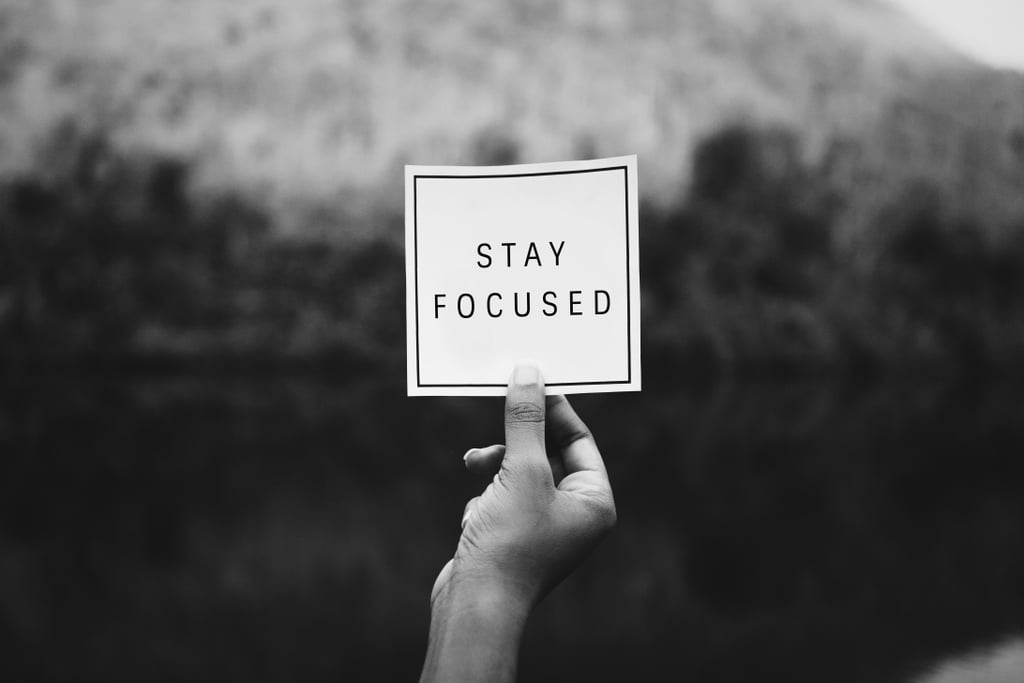No matter what your job is, chances are you'd benefit from finding some more moments of peace [1] during your work day (or night). By incorporating elements of mindfulness into your working life, you can help reduce your stress levels, be more productive, and communicate better.
There are plenty of mindfulness techniques [2], but these aren't always easy when you're at work — you can't just walk away to meditate whenever you feel like it! That's why you need practices that are simple to achieve, without needing to take breaks all the time. Ahead, check out 11 short, actionable tips that could help you get through a stressful day, and get ready to find your calm.
Start Each Day By Setting Your Intention

Intention counts for a lot with mindfulness. After all, mindfulness is about being aware of what's happening, and being in the moment. Get off on the right foot by consciously making a decision at the start of your shift/work day to try to be consciously present. Setting this intention in your mind every time you go to work will help set the tone.
Use a Mantra Throughout the Day

The chances are your mind will stray from your intention, so choose a mantra that works for you, and repeat it to yourself throughout the day. A positive affirmation can help bring a sense of calm when your stress levels are rising, perhaps after dealing with a challenging customer (try career coach Ashley Stahl's suggestion of: "Peace begins with me" [3]), or when prepping for a presentation (try Ashley's recommendation of: "I am strong, capable, and ready").
You might choose a different mantra each day, or have a favourite you stick with. Pick yours by asking yourself how you want to be in the world, and use the present tense. Keep it in your head, or write it on a post-it note and stick it somewhere you'll see regularly.
Breathe Deeply

Meditation can be as easy as breathing. You don't need to sit cross-legged, or be surrounded by complete silence. When you feel your stress levels rising, simply focus on your breathing — it will help bring your heart rate down. If you can, close your eyes, but it's not essential.
Breathe slowly and deeply through your nose into your belly. If it helps, you can try a breathing technique that's said to aid sleep [4]: breathe in for four, hold for seven, and release through your mouth for eight. If your mind wanders [5], acknowledge the thoughts, let them pass like clouds in the sky, and gently bring your attention back to your breath.
Set Reminders

We all breathe automatically, but when we're focused on tasks at work we aren't necessarily breathing deeply and slowly. You don't have to wait for a stressful situation to focus on deep breathing — do it regularly throughout your working day and it will help keep you calm.
With so much going on already in your mind, give yourself a helping hand by setting a regular reminder (on your phone, or whatever works for you) to breathe deeply. If you're sitting down for most of the day, take the opportunity to get up and stretch while you're at it.
Focus On One Thing at a Time

We're all so used to trying to multitask, but there's a school of thought that single-task focus [6] is more beneficial. Focusing on one thing is also what mindfulness is all about — giving our attention entirely to where we are.
Dealing with each task in turn can help with productivity and task completion. Our brains can actually only think about one thing at a time anyway, so multitasking is really just switching between tasks quickly – and that's not working with our brains' natural process.
Smell the Coffee (or Tea... or Juice)

It's easy to switch into autopilot mode when you're at work. Connecting with your five senses can bring you back to the present, and you can do this through "mindful eating".
Whenever you drink or eat something, give all your attention to it. Take a look at it, then close your eyes and breathe in its aroma. Notice how it feels in your mouth, and travelling down to your stomach. If you're chewing, listen to the sounds your jaw is making. Savour the taste.
This will put you firmly in the moment, increase your pleasure, and give you a momentary break from focusing on work.
Stand and Stare

It's not always possible to take a proper lunch break, but when you can, use the opportunity to detach from thoughts of work tasks past and future, and focus entirely on the now instead.
Mindful eating can help you achieve this, or you can simply stand and stare. You'll probably find you're more productive after taking a proper break, as you'll have rested and recharged, ready to concentrate again on whatever task at hand comes next.
Take Purposeful Pauses

Dan Harris, author of 10 Percent Happier told the New York Times [7] about the benefit of taking a "Purposeful Pause" at work. You can do this whenever you need to wait for something — the lift to arrive, your computer to warm up, or the printer to work.
Use that moment to check in with your body — how it feels to take a breath, or to stand or sit with the weight of your body balancing there. Focus on the sensations in your body. You can do this whenever you're walking anywhere — focus on the feeling of your feet and legs, rather than checking your phone. It can help break that autopilot mode.
Freshen Up

A splash of cool water on your face, or even just placing your wrist under running water for a few seconds, can help give you a physical realisation of the present moment.
If you can get outside at some point during your working day, grab that opportunity to reconnect with nature. You don't have to go for a walk in the park. Simply feeling the sun or wind on your face can help you feel physically grounded in the here and now.
End Each Work Day With a Gratitude Note

At the end of each day, have a quick appraisal of what's happened that's been good, or what you've achieved. Write down at least one positive thing, including why it made you happy.
This will help you focus on the positives and will give you a head start on feeling good about the next day at work. It also helps you draw a definite line under the day, and switch off.
Leave Work at Work

Finally, try to switch off from work by leaving it at the door when you finish for the day. Easier said than done, right? Your workplace can follow you home, through emails and even just your own thoughts about it.
Get into the habit of marking the end of the working day. That might be through the gratitude note we just mentioned, or writing a to-do list for the next day, so that you can feel comfortable knowing everything's in order.
Remind yourself that by switching off from work, you'll find it easier to be present with friends and family, and you'll also feel more refreshed when you start work the next day.